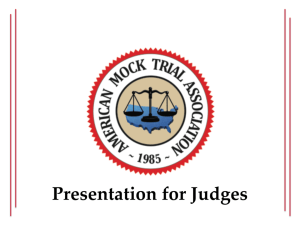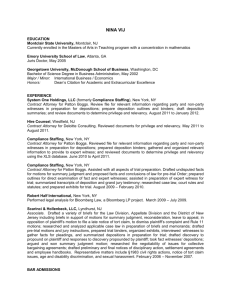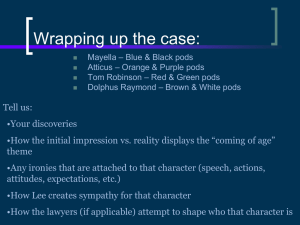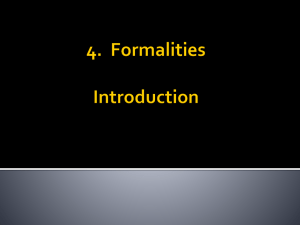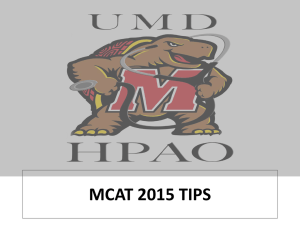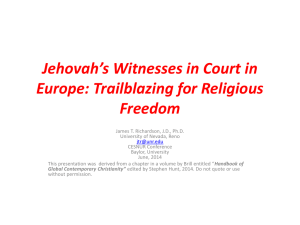Judges` PowerPoint
advertisement
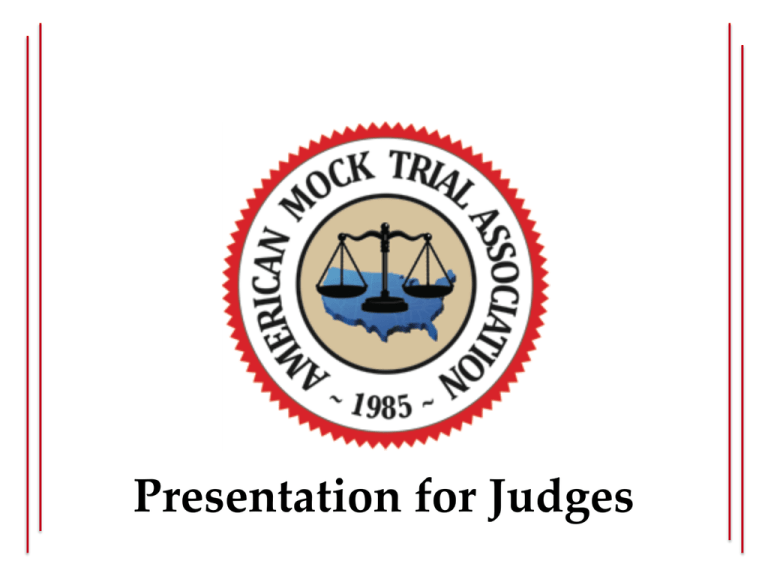
Presentation for Judges What is this Competition? • Simulation of a civil jury trial • Students portray attorneys and witnesses • Fictitious jurisdiction of Midlands – Midlands has its own case law – Midlands has its own statutes – Midlands has its own rules of evidence (that closely mirror the FREs) This Year’s Case: Park v. Duran • Summary: In 2010, Sydney Park invited classmate Jesse Duran to hang out at the Parks’ home. Both children were 11 years old. The Parks keep a gun in their home. That morning, the gun was discharged, killing Sydney. Sydney’s parents have filed a wrongful death lawsuit against Jesse’s parent, Hayden Duran. • If you have heard this case before, be aware that you may see a very different round this time because: – The Plaintiff team gets to choose between two very different theories of liability, and the Defense team has the option of raising affirmative defenses. – The teams are choosing witnesses from a pool of twelve options. – One of the witnesses has two very different depositions and may differ significantly between rounds. What is your role? • You are here to “judge” the competition. You will do so in panels of two or more individuals. • Judges fill three roles: – Preside over the trial (one person per round) – Score the trial (two people per round) – Provide feedback (everyone) – Reach a verdict Your Role: Presiding Over the Trial • One judge will preside over the trial and act as judge in the courtroom—ruling on objections and keeping the trial moving. • Trial consists of: • • • • • • • Pre-Trial Matters (including introductions) Opening statements Plaintiff case-in-chief (three witnesses) Customary break Defense case-in-chief (three witnesses) Customary break Closing Arguments (including rebuttal) Your Role: Presiding Over the Trial • Differences from Real-World trials: – Both teams must: • Present opening statements at the start of trial • Call three witnesses • Cross-examine all witnesses called – There are: • • • • • NO objections to openings or closings NO motions in limine, for a directed verdict, or mistrial NO side bars NO objections or questions from the judges NO scope limitations on cross-examination (but scope is limited on re-direct and re-cross examination) • NO requirements that expert witnesses be tendered Your Role: Scoring the Trial • Two judges will score the trial using this blue (carbon paper) ballot. Your Role: Scoring the Trial • Left = plaintiff/prosecution • Right = defense • Score 1-10 – 10 is high score – Use whole numbers (fractions/decimals will be disregarded) Your Role: Scoring the Trial • Score on the blue ballot as the trial proceeds. – Please do not wait until the end of the round to decide on scores. • Score on your own. – Please do not collaborate with other judges on scores. Your Role: Scoring the Trial • Score differences between teams. – Scale doesn’t matter, just be internally consistent. – Point differential is what matters. Your Role: Scoring the Trial • There are SEPARATE scores for: – – – – – Opening statements Direct examinations Cross examinations Closing arguments Witnesses on direct and cross. • There are NO SEPARATE scores for: – – – – – Pre-trial matters Re-direct examinations Re-cross examinations Rebuttal Objection arguments. Your Role: Scoring the Trial • At the end of the round, please rank the top four attorneys and witnesses from the round. Your Role: Scoring the Trial • Differences from other competitions: – Witnesses are scored • On both direct-examination and cross-examination – Witnesses are allowed to costume – Attorneys and witnesses are allowed to use demonstrative aids (subject to objection) Your Role: Scoring the Trial • Differences from other competitions: – This competition has NO “invention of fact” objection, but the rules do allow for impeachment if there is an invention of fact. • Teams may NOT invent a material fact on directexamination—such inventions are subject to impeachment. • If you believe a successful impeachment has occurred, you should reflect that in your score by penalizing the the violating team, rewarding the impeaching team, or both. Your Role: Commenting • All scoring judges should receive FOUR comment sheets (more carbon paper): – Students will fill out their names, roles, and team code. Your Role: Commenting • There are blanks to write comments on all parts. • Non-shaded boxes are for plaintiff or prosecution parts. • Shaded boxes are for defense parts. Your Role: Commenting • Students will get copies of written comments. • After the trial is complete, please provide a few minutes of verbal feedback as well. Roles of Others: Students • Students act as competitors in the trial. – Students’ school identity should remain anonymous until after the round. • Note that all trials are public. Do not assume the identity of the teams based on who enters the courtroom. • Students act as timekeepers. – The trial has a three-hour time limit and each part of the trial has time limits. – The students will keep you informed of time limits. – Please enforce time limits when you are informed of them. Roles of Others: AMTA Representatives • AMTA Representatives ensure that all rules are followed. • AMTA Representatives may enter the courtroom to inform you of time limit issues, please follow their instructions. • AMTA Representatives may enter the courtroom to resolve a conflict brought to their attention by students, please follow their instructions. Summarizing: The Big Things to Take Away • Presiding: – Let students argue, but listen to any time limitations students bring to your attention. • Scoring: – Score on performance, not merits of the case. – Score as the trial proceeds, not at the end of the round. – Fill in all blanks on blue score sheet legibly. • Commenting: – Students will get copies of all written comments. – Provide verbal feedback, but keep it to 10 minutes or less for the entire judging panel combined. What happens next? • You will be assigned to a judging panel. – Each panel will be at least two people. • You will be assigned to a room. – If you have already judged a team in that room at this tournament, then please do not begin the trial and let us know of the potential conflict. – If you are somehow affiliated with a team in that room (e.g. your child is on the team), then please do not begin the trial and let us know of the potential conflict.
